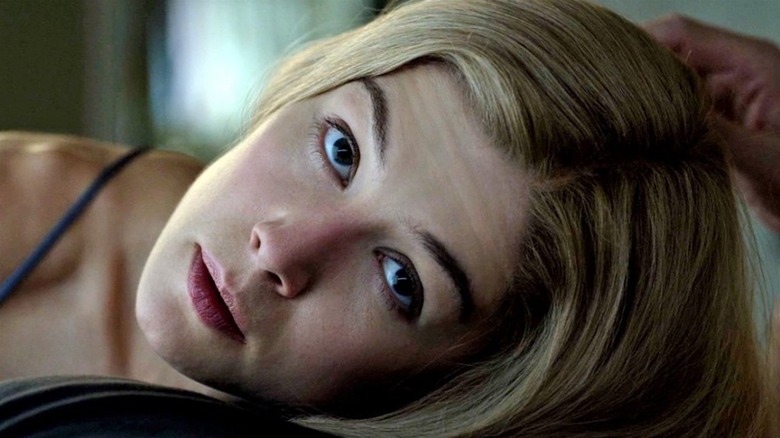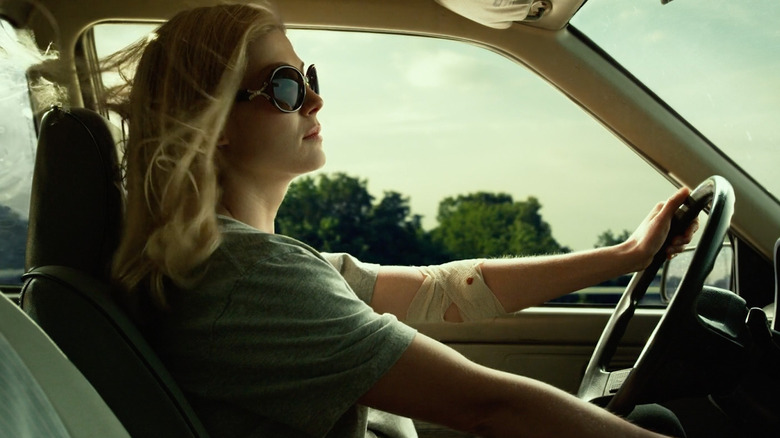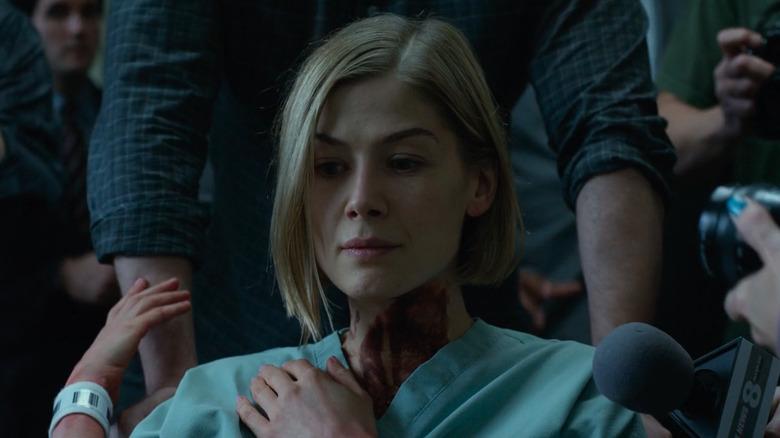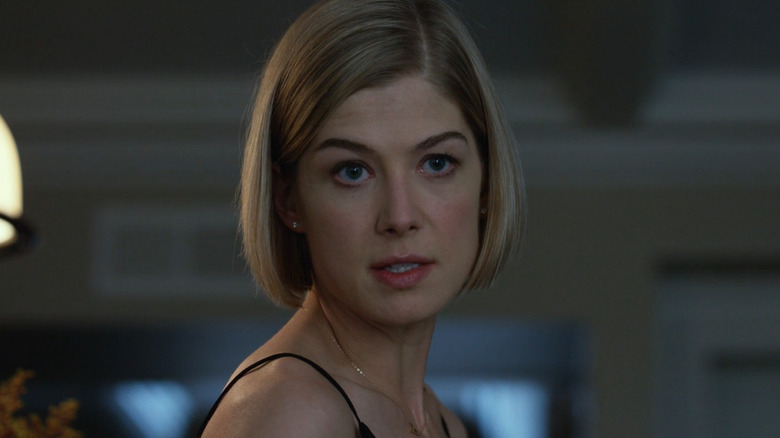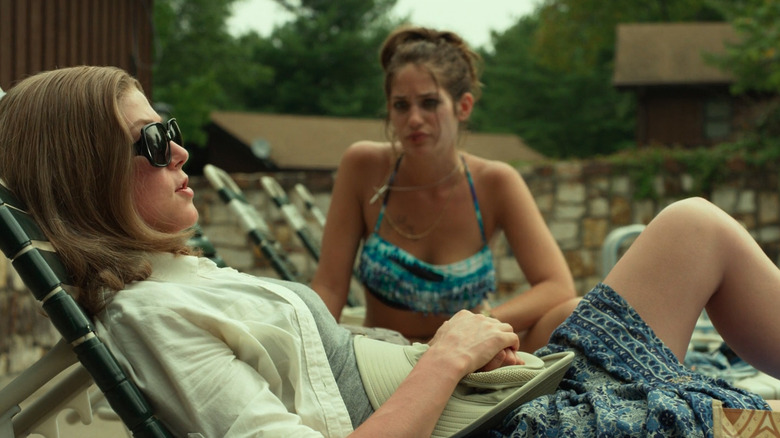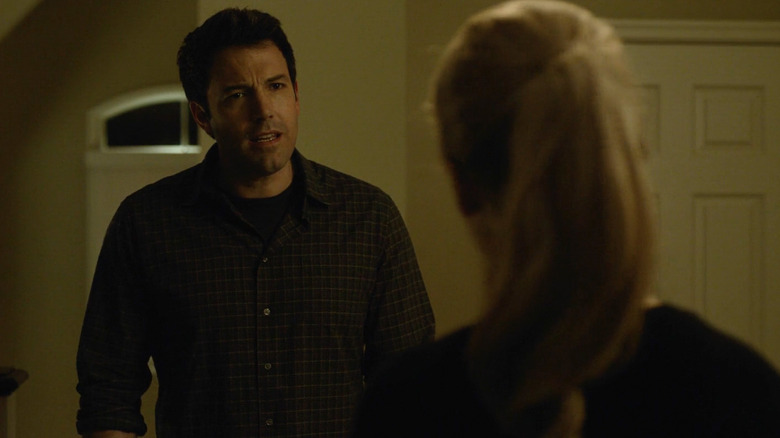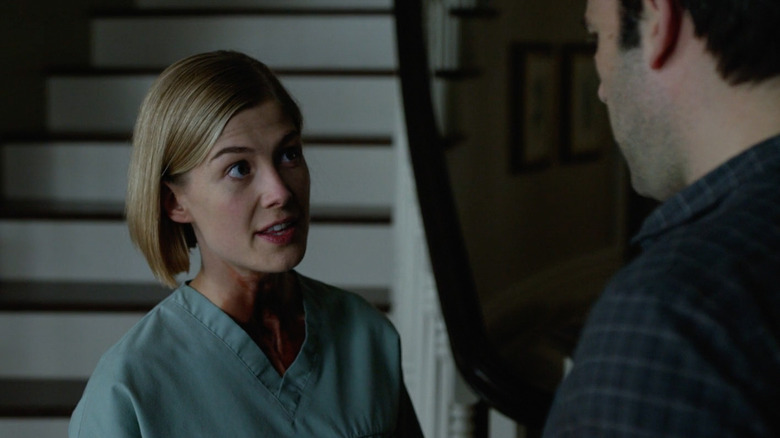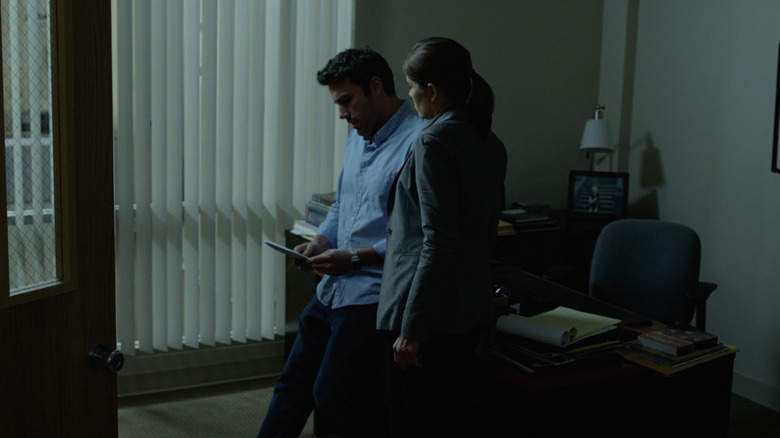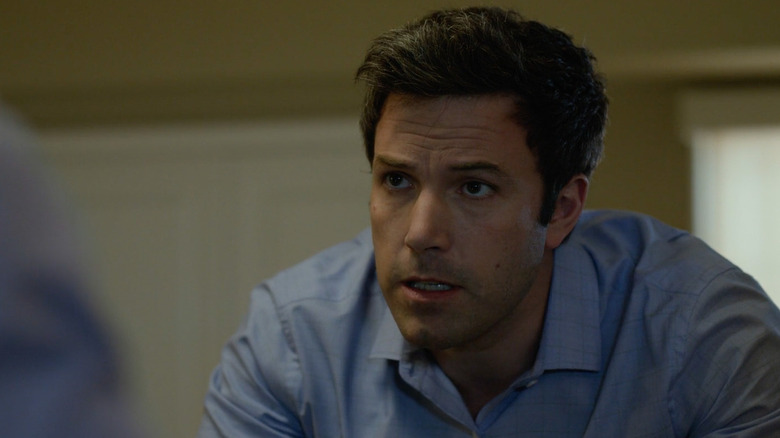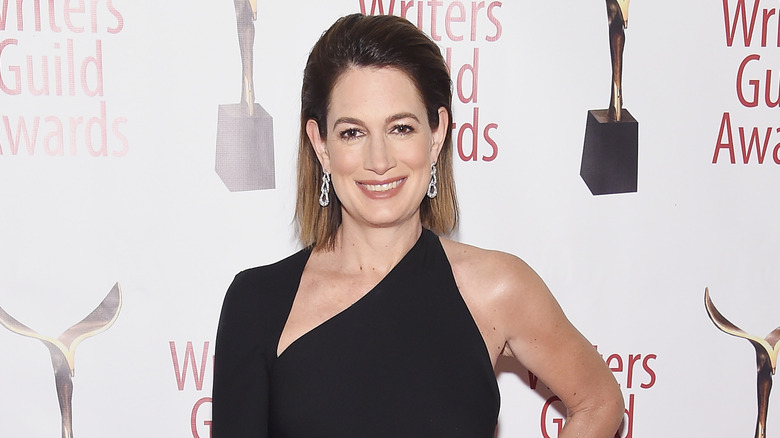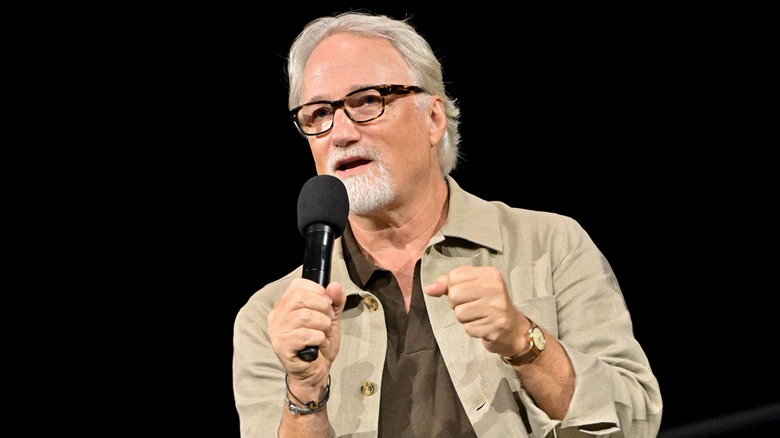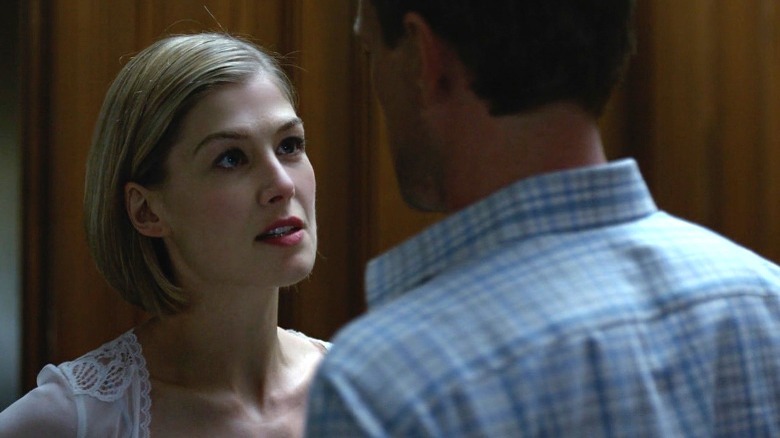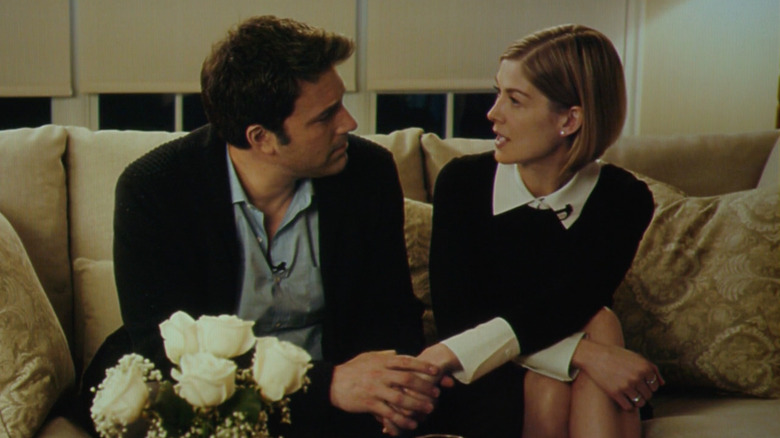The Ending Of Gone Girl Explained
Based on the novel of the same name by Gillian Flynn, "Gone Girl" might seem like your ordinary psychological thriller on the surface, but there are many layers to this twisting tale. One of the best thrillers of all time, it's about the murder of a woman and the slowly unfurling mystery of who did it. Penned by the book's author, the film centers on Amy Dunne (Rosamund Pike) and her husband Nick (Ben Affleck), a once-happy couple whose story is upended when Amy goes missing. Before long, the seemingly innocent Nick becomes the prime suspect in the investigation. Viewers are left to wonder what's happened to Amy, though the jigsaw pieces slowly fall into place: Flashbacks narrated by the missing woman reveal a different side to their marriage.
With several stunning plot twists that will leave your jaw on the floor, "Gone Girl" is a story of betrayal, abuse, and murder, but it's not exactly what we've come to expect from this type of film. By the end, there's so much to unravel that you might still be wondering what really happened and who was actually to blame for the story's most horrific crimes. If you're still confused, worry not, because we're going to finally explain the ending of "Gone Girl."
What you need to remember about the plot of Gone Girl
"Gone Girl" isn't your ordinary murder mystery. Not only does it have an unconventional story, but its biggest plot twist comes earlier than most — and still might be the best plot twist of all time. It begins with the disappearance of Amy Dunne, who was once the basis for a series of children's books, and whose husband Nick is a writer, too. But the couple had fallen on hard times recently, with both losing their jobs in New York and being forced to move back to Nick's small hometown in Missouri. Nick's aloof attitude after his wife goes missing, combined with some curious credit card purchases and evidence of money troubles, suggests to Detective Rhonda Boney (Kim Dickens) and the wider public that he may have killed his own wife.
Midway through the film, however, we learn that Amy isn't dead at all, and that she has been planning to fake her own murder for quite some time, with an elaborately detailed plan. As it turns out, she carefully constructs her own death scene to frame her husband, wanting to escape her marriage. She even goes as far as to plan a suicide that will further implicate Nick. But she also left behind a series of cryptic clues for Nick to find that point to the truth, and after he secures the services of renowned lawyer Tanner Bolt (Tyler Perry), he's hopeful that he can expose Amy's master plan with the help of his twin sister Margo (Carrie Coon).
What happened at the end of Gone Girl?
Fueled by the coverage of over-the-top cable news host Ellen Abbott (Missi Pyle), family, friends, and law enforcement all start turning on Nick, who becomes desperate to clear his name. But after it's discovered that he's had an affair with a younger woman and had recently added to his wife's life insurance policy, he looks even more guilty. To turn the tide he enlists another television presenter's help, agreeing to a public TV interview that he hopes will set the record straight. Unfortunately, police discover a fake diary Amy wrote to point the finger at Nick and he is ultimately arrested and charged with murder.
When Amy — who is hiding out with ex-boyfriend Desi Collings (Neil Patrick Harris) after being robbed in the Adirondacks — sees the interview, she makes a sudden turn and decides to save Nick from a death sentence. In a shockingly bloody scene, she seduces Desi and slashes his throat, killing him in cold blood. She then returns home and convinces authorities that it was Desi who had kidnapped, imprisoned, and raped her at his remote lake house. While Nick, Margo, Bolt, and Boney all know she's lying, there's not enough evidence to prove it, and the FBI closes the case. In the film's final scenes, Amy reveals in a joint television interview with Nick that she's pregnant with their first child, and Nick reluctantly agrees to stay with her to start a family.
How did Amy get pregnant at the end of Gone Girl?
The final twist in the film is the pregnancy that Amy reveals to the world at the end of the movie. She'd announced the pregnancy to Nick just before sitting down to the television interview, shocking her husband and nearly sending him away in a fit of rage — because he'd refused to sleep with her since she'd returned home. So how exactly did she get pregnant, and is the baby really Nick's? Some may have suspected that the pregnancy was the result of her recent sexual encounter with Desi, but the real answer is found earlier in the film in a scene between Nick and his sister.
In that scene, Nick claimed he'd wanted to have a baby with Amy, and to prove it he showed Margo a letter from a sperm bank. He'd gone there after he and Amy had trouble conceiving, and the letter was a notice that his sample was due for disposal if it wasn't used. At the end of "Gone Girl," though, Amy's pregnancy is announced and she seems confident that she'll pass a paternity test, so it can't be Desi's baby. Though she doesn't say it specifically, she implies that Nick's sperm was never destroyed and that she impregnated herself with his sample at some point earlier, in secret. It was all part of her twisted plan to keep Nick from leaving her.
Who was the real villain in Gone Girl?
The vast majority of murder mysteries have a clear hero and villain. In most stories like this one, a suspect who's been framed is usually completely innocent, and the real villain is easy to spot. But "Gone Girl" isn't your typical thriller: Nobody is truly without guilt. From Amy to Nick, from Margo to TV host Ellen Abbott, they all have some complicity in the film's worst crimes.
Nick, who we are initially led to believe is an upstanding husband being railroaded by a psychotic woman, is revealed to be both a liar and a cheater. He had an affair with a student half his age, and he lied to police — as well as his own sister — about much of his marriage. Margo, too, helped conceal evidence and hide information from authorities, while Abbott used her platform to demonize an innocent man.
But, when it comes to the real villain of the story, there can be no mistaking that Amy is the one person truly responsible for the most horrific acts. A textbook narcissist and possibly a sociopath, we learn that Amy has been using men for her own ends for years, and she has even wrongly accused multiple ex-boyfriends of serious crimes. Her obsession with controlling the men in her life makes her want to destroy Nick — almost to the point of seeing him executed for murder.
Was Amy ever really afraid of Nick?
One of the most distinctive storytelling devices in "Gone Girl" is the film's dueling narratives. While we see Nick searching for his wife, slowly revealing details of their life together, we also hear Amy reading out her diary and describing their relationship very differently. In her version, Nick is seen as an abusive, cheating husband prone to violence who she eventually comes to fear, prompting her to buy a gun for self defense. But when the diary is exposed as part of her plan to frame Nick, audiences may be wondering just how much of what she said was real.
While we can't say for certain (because Nick may also be an unreliable narrator), it seems likely that almost all of the abuse that Amy described in her diary was fabricated. While it's true that Nick admitted to being a bad husband — acknowledging his infidelity — he denied ever laying a hand on his wife. Late in the film, we also get an admission from Amy that it wasn't abuse that made her want out of her marriage to Nick, but his inability to be the man she wanted to spend her life with; A driven, devoted, and adoring husband. When he went on TV and professed his love for her, and his determination to find her, it rekindled her feelings for him.
Why did Amy do it, and why did she return to Nick?
Though Amy reveals her master plan in great detail, admitting to faking her diary and staging her own murder scene, her motives are murky at best. She hates Nick to the point of wanting him dead, yet even the crimes she accuses him of in her diary — pushing her to the floor and threatening her with violence — don't seem consistent with her level of viciousness. That's because Amy isn't what she appears to be.
As explored in the film, Amy seems to have an insatiable desire for attention and adoration from those around her, especially men. This might stem from her own childhood, where she became a minor celebrity, the basis for a popular series of children's books written by her parents. This narcissism is fed early in her marriage by Nick's endless adoration, but that affection dissipates when he loses his job. Amy was then forced to move to Nick's hometown, and she drained her savings to help him invest in a local bar. Then, after discovering his infidelity, Amy's anger turned to bloody rage.
So why did Amy go back to Nick and abandon her plan? As she says in the end, Nick's television interview showed her the driven man she was originally attracted to. But the real question is whether Nick can continue to be that man and save himself from a life of abuse and torment at her hands.
Why did Amy leave all those clues?
It's bad enough that Amy framed Nick for her own murder, but she also left behind a series of cryptic, tormenting clues for him and police to find. Nick thought nothing of them at first — he and Amy regularly played scavenger hunt games — but the notes left behind didn't seem so innocent: They were all left in places where Nick had been having sexual encounters with his younger mistress. The clues even led him to the location of her incriminating diary, but police found it first. Why did she leave these clues?
In addition to being a narcissist and probable sociopath, Amy seems to have a desire to prove she's smarter than everyone else. The clues were left to taunt Nick, and by providing him with a secret code that would allow him to find her diary, it gave him the opportunity to defeat her and prove his innocence. But he would only be able to do it if he could decipher her puzzle — and, ultimately, he was too late, giving her another victory.
How the ending of Gone Girl compares to the novel
Adapted from an acclaimed novel, "Gone Girl" does its best to stay true to the original source material. While most of the story was translated accurately to the screen, there were some subtle alterations made by director David Fincher, particularly to the movie's ending. In the film, Amy murders Desi while having sex with him, brutally slashing his throat as she straddles him in bed in the film's most jaw-dropping moment. But, in the book, Amy is a bit more merciful, drugging him into unconsciousness before she kills him in the same manner, with a knife across the throat. This change was clearly made to make Amy look even more vicious.
Similarly, the movie leaves out a crucial piece of Amy's fabricated evidence against Nick that further explains why he remains with her at the end of the story. In the book, she ingests anti-freeze that she promptly vomits up. She then keeps it saved as further proof of Nick's intent to kill her. As a fail-safe, she even threatens to use this evidence if he ever tries to leave her, while also insinuating that she'll never let him see their child if he tries to expose her, as he plans to write a tell-all book. The film also removes a subplot where Nick seems to fall back in love with Amy through the various clues she left him, reminded of their previous happy relationship.
What Gillian Flynn has said about the ending of Gone Girl
Beyond some of the smaller details, the ending of "Gone Girl" largely follows the book. Its author, Gillian Flynn, has talked about why she chose such a controversial ending. "It was the only thing that made sense to me, that made sense to what was true to the book and true to the characters," she told Entertainment Weekly. "Amy's not going to end up in jail," she continued, claiming that while many fans might have wanted to see Amy face justice, that kind of ending wouldn't have been any better. "People think they would find that satisfying, if she were caught and punished, [but] I promise you, I just don't think you'd find it satisfying for Amy to end up in a prison cell just sitting in a little box."
Many fans over the years, of both the book and the film adaptation, have said that they would have preferred to see Amy get her comeuppance and be killed during the finale, which also made Flynn scoff. "Who's going to do that? I'm not going to have Nick do that. He's not going to do it," she said. Ultimately, Flynn chose an ending that wasn't just unconventional, but truly unsettling, and this was by design. "I've always loved those endings of unease," she said. What happens next is left open, but don't expect a follow-up to explore what becomes of the disquiet couple, as Flynn promises there was never any intent for a sequel.
What David Fincher has said about the ending of Gone Girl
Director David Fincher opened up about why the film — and its ending — interested him during a 2014 Q&A. "I was most interested in the idea of narcissism as a way to hold two people together," he revealed (via IndieWire). "And the notion that we project the best version of ourselves not only to seduce somebody that we imagine to be perfect for us, but also perfect for our narcissistic rejection."
Beyond the themes the film explored, Fincher says that he was also intrigued by the salaciousness of the story, which he simply found "hilarious." He even admitted that there were moments when he was rooting for Amy during her plan to frame her husband. But what really drew him in was the reaction he knew the ending would elicit. "I also like movies where the audience [recoils]. That's as valid as cheering for the exploding Death Star." If he was looking for a story that would draw shock and awe from its audience, he certainly found it.
What the cast has said about the ending of Gone Girl
Nick from "Gone Girl" is undoubtedly one of Ben Affleck's best roles to date. Speaking to the Detroit Free Press, the actor said that it was crucial the ending remain a secret ahead of the film's release. In his opinion, certain reporters didn't respect this. "We just did an article with The New York Times and they wanted to see the movie," Affleck said. "We did the interview, and lo and behold, the person included basically the essence of the plot in her article. I just felt like this isn't journalism, this isn't news. This is just wanting to be first and not caring if it ruins people's enjoyment of something."
Talking to Collider, Affleck's co-star Rosamund Pike agreed that secrecy was important, and praised Fincher for the movie's marketing campaign. But it was the film's bloody murder scene that caused her much more concern. "If you're going to do something like that, you have to do it with a certain degree of accuracy." She wanted the moment where Amy slashes Desi's throat to be realistic, so she decided to do some research — and Pike did something beyond nasty. "I actually went to a butcher and asked them if they wouldn't mind me just using a box cutter on a pig carcass, just to understand what it would be like."
How fans and critics reacted to the ending of Gone Girl
The ending of "Gone Girl" makes it an unconventional thriller. The perpetrator of the story's worst crimes didn't just get away scot-free, but got everything they wanted. As Gillian Flynn alluded to in her Entertainment Weekly interview, audiences were polarized, with many feeling the film's dark ending should have been different. In fact, many fans and even professional critics were so miffed at the film's conclusion that they posited their own endings that they thought would have been better.
Adam Appleton of the Southeast Missourian proposed five alternative endings, including one version where Amy doesn't return, kept prisoner by Desi, while Nick is found guilty of her murder. "This ending would surely appeal to Fincher's dark side," Appleton wrote. Meanwhile, over on PopSugar, another six possible conclusions were raised by writer Ryan Roschke, with one of the more interesting ideas seeing Desi surviving Amy's attack and murdering both Amy and Nick in a slasher-like ending that feels more like a traditional plot twist.
But it was fans on Reddit who seemed to have the most fun. In one post, u/-AlternateEnding- shared a lengthy idea of their own. In this version, following the film's actual ending, Nick's rage boils over and he kills Amy for real. "This could be by him accidentally pushing Amy down the stairs (the event that Amy concocted while trying to frame him)," they wrote.
